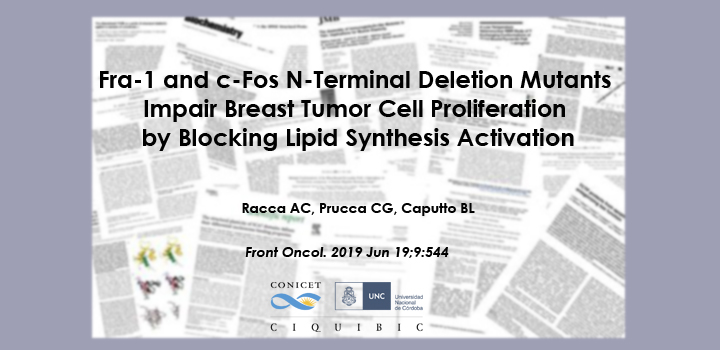Racca et al. Front. Oncol. 2019
Tumor cells require high rates of lipid synthesis to support membrane biogenesis for their exacerbated growth. The only two proteins known that activate phospholipid synthesis are Fra-1 and c-Fos, two members of the AP-1 family of transcription factors. These proteins that are overexpressed in human breast malignant tumors increase the rate of phospholipid synthesis at the endoplasmic reticulum through a mechanism independent of their nuclear function. The aim of this study was to inhibit breast tumor cell proliferation by modulating c-Fos and Fra-1 and regulate membrane biogenesis by controlling lipid synthesis rates. The molecular mechanism by which Fra-1 and c-Fos activate phospholipid synthesis was examined. Both proteins physically associate with the rate limiting enzyme CDP-DAG synthase through their N-terminus domain and activate it through their basic domain; neither protein associates to or activates the enzyme phosphatidylinositol synthase as determined through in vitro enzymatic reactions and FRET experiments. The N-terminus domain of both proteins act as negative dominant peptides that physically associate with CDP-DAG synthase but do not activate it. Proliferation of MDA-MB231 and 4T1 cells was impaired in vitro after inducing them to proliferate in the presence of the negative dominant peptides derived from Fra-1 and c-Fos. When tumors generated in Balb/c mice with the breast tumor cell line 4T1 were treated with these negative dominant peptides, a significant reduction in tumor growth was observed. Consequently, these Fra-1 and c-Fos negative dominant peptides can be exploited as a new therapeutic strategy to impair breast tumor cell proliferation.
Autores: Racca AC, Prucca CG, Caputto BL.



